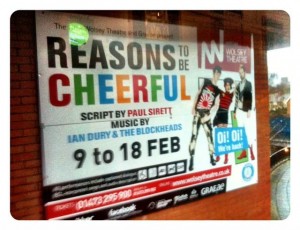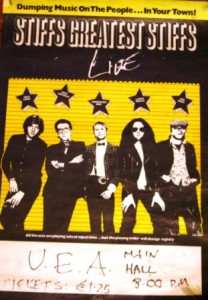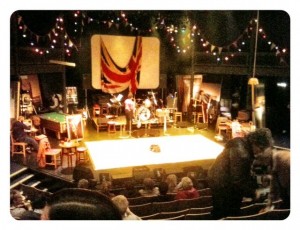 Part 4 of the reasons to be cheerful must be the revival of this play / musical, which brings together the performance of Graeae—Britain’s leading theatre company for actors and workers with disabilities—with the songs of Ian Dury, arguably Britain’s highest profile disabled pop singer in his day. Graeae was founded in 1980, the year after Dury’s no. 1 single ‘Hit me with your rhythm stick’ and the year before his career-shattering disability campaign single ‘Spasticus Autisticus’. This production is a pretty loosely-scripted play that offers a plot involving some late 1970s punk rockers hanging on, sometimes off, live versions of a dozen or so Dury classics. I was delighted to hear the early single ‘Crippled with nerves’ included (and reprised), since I’ve use that song title for some work I did on Dury and the polio/pop generation myself. (It forms part of chapter one of my forthcoming book Shakin’ All Over: Popular Music and Disability.) I saw the play at the New Wolsey Theatre in Ipswich over the weekend (a terrific space by the way, and some great upcoming shows). I’d first seen Dury on the Stiffs tour at UEA in Norwich in 1977, so there was a nice symmetry about going back to East Anglia to catch up.
Part 4 of the reasons to be cheerful must be the revival of this play / musical, which brings together the performance of Graeae—Britain’s leading theatre company for actors and workers with disabilities—with the songs of Ian Dury, arguably Britain’s highest profile disabled pop singer in his day. Graeae was founded in 1980, the year after Dury’s no. 1 single ‘Hit me with your rhythm stick’ and the year before his career-shattering disability campaign single ‘Spasticus Autisticus’. This production is a pretty loosely-scripted play that offers a plot involving some late 1970s punk rockers hanging on, sometimes off, live versions of a dozen or so Dury classics. I was delighted to hear the early single ‘Crippled with nerves’ included (and reprised), since I’ve use that song title for some work I did on Dury and the polio/pop generation myself. (It forms part of chapter one of my forthcoming book Shakin’ All Over: Popular Music and Disability.) I saw the play at the New Wolsey Theatre in Ipswich over the weekend (a terrific space by the way, and some great upcoming shows). I’d first seen Dury on the Stiffs tour at UEA in Norwich in 1977, so there was a nice symmetry about going back to East Anglia to catch up.
 But why no ‘Hey hey take me away’? Maybe because it is Dury’s most harrowing and direct song about disability, and the abusive treatment of (and by) youngsters in residential special schools? I suppose such a song doesn’t really fit the feelgood if righteous atmosphere of the play. And for a play full of audience participation—more a rock gig that a play in fact—with a dozen and more characters and musicians on stage sharing banter, and twiglets, with the public, not doing the call-and-response style ‘I’m Spasticus!’ at the end of what was actually a fiercely, fiercely powerful version of that still brilliant song felt a misjudged missed opportunity. By the way, giving that song to the outstanding female lead, physically disabled punkette Nadine, who sings it after she’s overheard herself described as a ‘sympathy shag’ by her boyfriend, makes it convincingly angry and angrier. Hello to you out there in Normal Land.
But why no ‘Hey hey take me away’? Maybe because it is Dury’s most harrowing and direct song about disability, and the abusive treatment of (and by) youngsters in residential special schools? I suppose such a song doesn’t really fit the feelgood if righteous atmosphere of the play. And for a play full of audience participation—more a rock gig that a play in fact—with a dozen and more characters and musicians on stage sharing banter, and twiglets, with the public, not doing the call-and-response style ‘I’m Spasticus!’ at the end of what was actually a fiercely, fiercely powerful version of that still brilliant song felt a misjudged missed opportunity. By the way, giving that song to the outstanding female lead, physically disabled punkette Nadine, who sings it after she’s overheard herself described as a ‘sympathy shag’ by her boyfriend, makes it convincingly angry and angrier. Hello to you out there in Normal Land.
The revelation was a fabulously sexy staging of ‘Wake up and make love with me’, where the centre stage was empty but for a lowlit spot circle with BSL signer and dancer Debbie er signing the song and its acts with hands, body, eyes, and singer John Kelly, a central still presence. It’s easy to overdo Dury, and lose the subtleness his voice and face could have in all the Oi! Oi! cockney stuff (see Andy Sirkis’s occasional lapse into gurn in the recent biopic), but that’s exactly what Kelly doesn’t do. Instead there is a careful kind of underperformance from him, in which his voice does almost all the work. This is a guy in a motorised wheelchair who is not, as they say, severely able-bodied, and most of whose choreography consists of little moves of the wheelchair, circles on the stage, or an occasional rhythmic shift of the head and neck on ‘Sex & drugs & rock & roll’ (just like Dury used to do). A black-gloved hand on a wasted arm holding a mic stand ‘like it’s a surgical appliance’ (as a review once described Dury) elegantly makes the link of a disabled pop performance tradition: Gene Vincent-Dury-Graeae. The erotic charge of Debbie and Kelly’s performance on ‘Wake up’ sets up the terrifically mundane post-coital last verse wonderfully: ‘I’ll go and get the post/And make some tea and toast/You have another sleep love/It’s me that needs it most’. In this song and in the accusation and reclamation of ‘Spasticus’ the play moves most confidently away from any easy punk nostalgia.
 What a show! 13 people on stage throughout—actors, musicians, signers, facilitators—and a big busy set that’s a cross between a rock gig stage and an Essex pub, with a drum kit centre-rear and a pool table at the side, with a slide show overhead showing all the lyrics, captioned dialogue, and some fun animations. Oh and bunting and strings of lightbulbs round stage and stalls to give a salty flavour. (Dury contracted his polio in the seaside town of Southend.) A great cast in ensemble, and some terrific musicians too. In authentic punk style, the show’s joins and edges—its rips and torns—as well as the raw and obvious emotions of youthful anger and desire are all on display. Most of the singing responsibilities are taken by the two men in wheelchairs. OK the script and plot could have done with a bit more work, but the power of the show, that has the audience clapping every number and whooping and screaming for more at the end, lies in its capturing the performance of the music. More: it reminds us of how a popular music artiste had important things to say about being disabled, and that those things and that culture still matter.
What a show! 13 people on stage throughout—actors, musicians, signers, facilitators—and a big busy set that’s a cross between a rock gig stage and an Essex pub, with a drum kit centre-rear and a pool table at the side, with a slide show overhead showing all the lyrics, captioned dialogue, and some fun animations. Oh and bunting and strings of lightbulbs round stage and stalls to give a salty flavour. (Dury contracted his polio in the seaside town of Southend.) A great cast in ensemble, and some terrific musicians too. In authentic punk style, the show’s joins and edges—its rips and torns—as well as the raw and obvious emotions of youthful anger and desire are all on display. Most of the singing responsibilities are taken by the two men in wheelchairs. OK the script and plot could have done with a bit more work, but the power of the show, that has the audience clapping every number and whooping and screaming for more at the end, lies in its capturing the performance of the music. More: it reminds us of how a popular music artiste had important things to say about being disabled, and that those things and that culture still matter.
And there are some great gags too. The lead punk Vinnie breaks the frame to tell us that that singer John Kelly actually wrote as a youngster to the BBC in 1981 when he heard that ‘Spasticus Autisticus’ had been banned. ‘What did you say in your letter, John?’ asks Vinnie. ‘Dear Director-General of the BBC, You’re a cunt,’ replies John to raucous laughter, adding with feigned disbelief, ‘And I never even got a reply.’ Vinnie’s dad, a working-class socialist activist, does a swearing rant against the Tories (this is 1979 remember), finishing with The Tories are … the Tories are… He’s tired himself out—he’s dying you see—and then he remembers the Dury introduction to ‘Plaistow Patricia’: The Tories are [smiles to audience] … ‘arseholes, bastards, fucking cunts and pricks!’ And away goes the band, nearly as good as the Blockheads, which is a BIG compliment.
Graeae’s Reasons to be Cheerful is touring England and Scotland until April 2012. See it or be unhappy. At the end you will demand encores plural, loudly.
